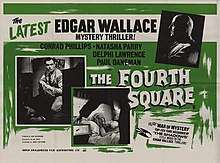The Fourth Square
The Fourth Square is a 1961 British crime film directed by Allan Davis and starring Conrad Phillips, Natasha Parry and Delphi Lawrence. Part of the long-running series of Edgar Wallace Mysteries films made at Merton Park Studios, it is loosely based on the 1929 novel Four Square Jane by Edgar Wallace.[1]
| The Fourth Square | |
|---|---|
 | |
| Directed by | Allan Davis |
| Produced by | Jack Greenwood Jim O'Connolly |
| Written by | James Eastwood |
| Based on | Four Square Jane by Edgar Wallace |
| Starring | Conrad Phillips Natasha Parry Delphi Lawrence |
| Music by | James Stevens |
| Cinematography | Gerald Moss |
| Edited by | Derek Holding |
Production company | Merton Park Studios |
| Distributed by | Anglo-Amalgamated |
Release date | June 1961 |
Running time | 57 minutes |
| Country | United Kingdom |
| Language | English |
The film's sets were designed by the art director Peter Mullins.
Cast
- Conrad Phillips as Bill Lawrence
- Natasha Parry as Sandra Martin
- Delphi Lawrence as Nina Stewart
- Paul Daneman as Henry Adams
- Miriam Karlin as Josette
- Jacqueline Jones as Marie Labonne
- Anthony Newlands as Tom Alvarez
- Basil Dignam as Inspector Forbes
- Harold Kasket as Philippe
- Edward Rees as Sergeant Harris
- Jack Melford as Stewart
- Vilma Ann Leslie as Fiona Foster
- Gwen Williams as Mrs. Potter
- Barrie Ingham as Gordon
- Constance Lorne as Lady in hairdressers
- Rachel Lloyd as Receptionist
- John Warwick as Police Sgt.
- Keith Goodman as 1st Uniformed P.C.
- Tom Gill as 2nd Uniformed P.C.
- Edward de Souza as 1st Reporter
- Marina Martin as 2nd Reporter
- Peter Thomas as 3rd Reporter
- Frank Porter as Compere
- Nicolas Chagrin as Michel
- George Hilsdon as Police Constable
gollark: Ah, yes, there is also `cache`.
gollark: I think it's `lru_cache`.
gollark: It's a lisp. That syntax wouldn't even make sense.
gollark: No.
gollark: Seriously! Python has no TCO.
References
- Goble p.486
Bibliography
- Goble, Alan. The Complete Index to Literary Sources in Film. Walter de Gruyter, 1999.
This article is issued from Wikipedia. The text is licensed under Creative Commons - Attribution - Sharealike. Additional terms may apply for the media files.